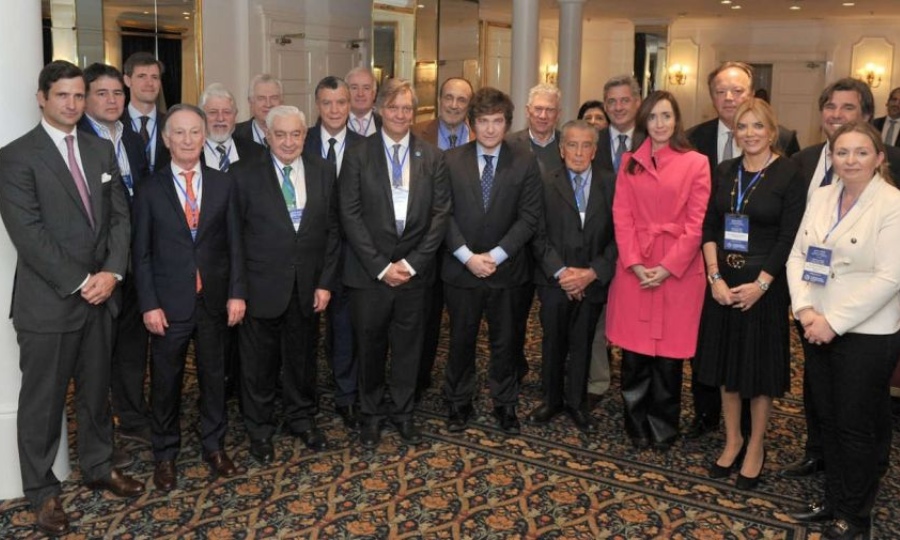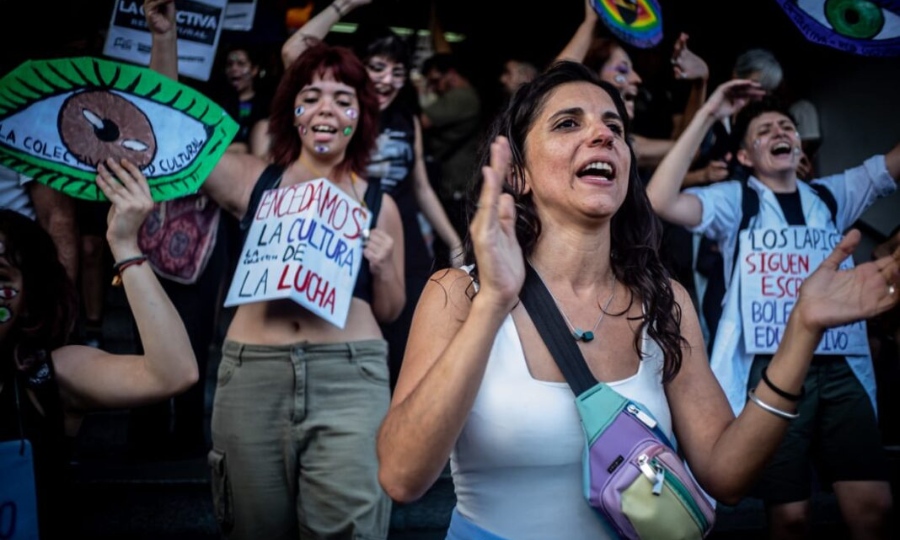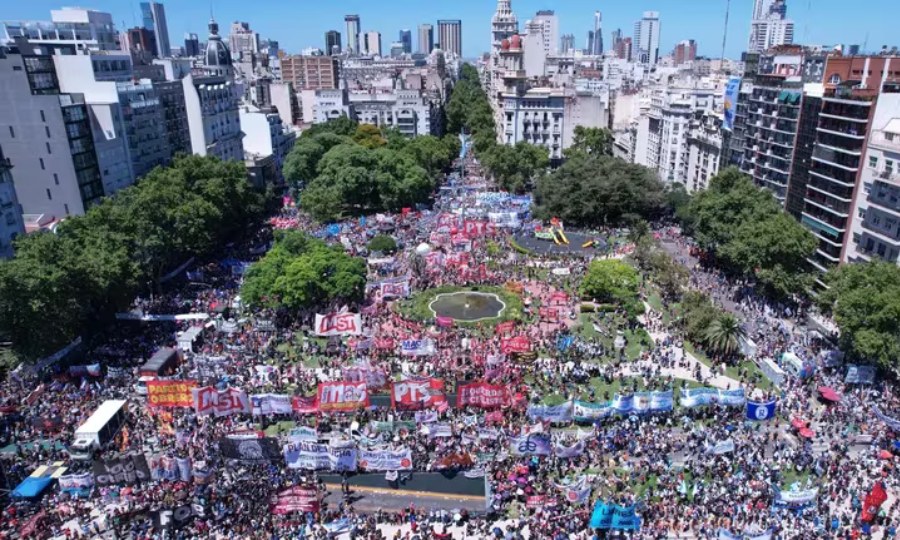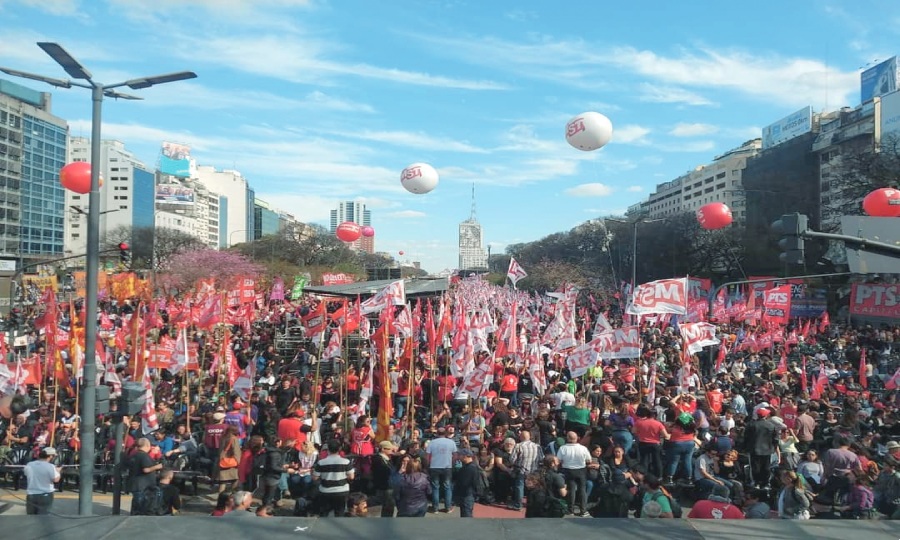
In a few days Milei’s term in office will just reach the three-month mark. The brutal nature of his attack on the working population and the middle sectors makes it seem like an eternity. He does not have much to celebrate either. His brief term in office is sailing between political crisis, bills that are not passing, a questioned Necessity and Urgency Decree (DNU) and a growing social unrest due to the worsening of the economic situation after the savage austerity measures launched by the presidency.
The critical context has driven in the last weeks the fears of important imperialist and bourgeois sectors that supported him from day one, who now, dismayed, wonder if the ship of the Milei project will reach safe harbor. The incessant inflation that hits the majorities, the leap in the social uprise expressed in sectoral strikes, combined with a libertarian leader who insults and denounces in all directions, including other sectors of the bourgeois political power that he would need as allies, configured a situation that alerted the central economic power, the red circle, who in different ways made known their discontent and their request for moderation regarding the manner, although they share the structural and reactionary changes that Milei proposes in terms of content.
The President’s speech during the opening of the Congress sessions last Friday cannot be seriously understood outside this political and social context. Said speech was thought and prepared word by word, together with a communicational montage that tried in every detail to show through TV cameras a strong presidential figure and the same strength of his ideas. The show that was put together, which included serial applauders following a pre-molded script, reaffirms us in an analysis beyond that performance. In reality, such presidential strength does exist, but at other levels that are not so certain. In perspective, this support is decreasing in parallel to the increase of the social consequences of the ongoing austerity measures.
Regardless of our analysis, it is clear that the president’s political need was to speak to the entire country as if the majority of the population was actually supporting him. Except that this is not the case. There is not a single serious, scientific piece of data that demonstrates majority support today. It would not be accurate either to say that such support does not exist. It does exist and it is important for a large part of the electorate. It reflects the combination of expectations that a great part of his voters still have, with the support that big media and big capitalists still give him and the lack of another credible and visible political alternative for society. The picture after three months of government is that of a politically and socially polarized country and it may be like that for a long time. This does not eliminate another factor of reality that feeds the crisis: the trend is towards the loss of social support for Milei’s government, it will not have more and more followers but more and more social anger. And there is no applause inside a room that can ignore the dynamic reality we are living.
Milei’s caste and the others
In truth, one does not have to be extremely intelligent to understand that in the midst of the austerity and increase of poverty, Milei needed to focus on other issues. Thus, in an important part of his speech, he referred to the caste as he has been doing since the electoral campaign. He focused on criticizing traditional politics and other privileged sectors, of which there are too many in this country, in order to empathize with a large part of the population that evidently loathes those who have governed our country very badly.
It is also worth saying that it is at least a little strange, not to say cynical, that a president who comes from a large capitalist company, who has worked for the repressor Antonio Bussi and who has Bullrich, Caputo and Menem among his main government aides, and Sturzenegger as a great advisor, talks about the caste. They and other libertarian officials are the direct and favorite children of the worst political and economic castes of the country.

There are castes that have governed and there are castes that govern today. Yesterday and today all of them govern for their bosses of the central economic power: the big national and international capitalists who, as always, need a political power in office to guarantee their profits. When we hear the head of the IMF, the U.S. Secretary of State or the tycoon Elon Musk praising Milei that is what we are talking about; the intrinsic relationship between the bosses of the world and their castes, yesterday peronistas, macristas before that and today libertarians. In this situation, Milei spoke out and said that without an agreement there will be confrontation and that he is going to speed up for all or nothing.
Inheritance and orgy of expenses
As it was foreseeable and in fact not at all original when repeating the script of other presidents, the current leader deployed from the Congress and standing in front of a podium an endless number of criticisms to the heavy inheritance received from the previous Peronist government. He should not have made much of an effort, given the evident catastrophe bequeathed to us by the government of Unión por la Patria. If anything brought Milei to the Casa Rosada, it was precisely the malpractice of Peronism in office, although all the wings of the PJ leadership are now trying to look the other way.
Even so, the “orgy of expenses” that Milei used as a metaphor to describe the previous government squandering is a justification for the dismantling of the current State and of all its responsibility in attending to the social rights acquired or to be acquired with full rights of the population. Malpractice must be overcome with a qualitatively better intervention, not by suffocating the patient to death.
For now, the time where it is enough to delve into the past to explain all evils is giving way to the social concerns of the present. It will be less and less politically effective for Milei to refer to a near past, but in an increasingly distant dynamic. In deep crises, the population ends up reasoning in a way that is as concrete as its reality. If for millions of working families the end of the month is further and further away from their salaries, social unrest will grow exponentially, not thinking about the heavy inheritance but focused against those responsible for such a tight daily life.
Obstacle race to May 25
After the collapse of the Omnibus Law, with a DNU that may enter into crisis in the next parliamentary sessions and a Protocol surpassed when there are actions of thousands and questioned by sectors of the judicial system, it should come as no surprise that Milei has taken note of the need to have some allies and decided to announce a new attempt to consolidate his project before it is totally wrecked. With a high dose of symbolism he deployed from the Congress the proposal that from now on will be under debate in the entire political superstructure: his 10 points and principles to economically and politically reorganize the country.
In his ten libertarian commandments there are no new ideas or flashes of daring imagination, but only an updated and ordered recipe book of the worst austerity measures ever attempted with fundamental reforms to guarantee an increase in the rate of profit of the capitalists. Thus we can make a brief tour through the defense of private property of a privileged minority, the request for a slave labor reform, changes in the tax system so that those who have less pay more, the attempt to change the pension system to reduce “spending” and allow its at least partial privatization. Additionally, there is the total reduction of public spending in sensitive areas such as health, education or social assistance, the unlimited opening to extractive corporations to exploit, plunder and pollute, and the absolute surrender to the great powers of Western imperialism. All of this is framed in his ongoing idea of a much more authoritarian political regime, as evidenced by his attachment to DNU’s, executive resolutions, his disregard for parliament, his attack on the right to strike and his attempt to ban demonstrations. His 10 noxious commandments are directly interrelated to a harsh and repressive regime that guarantees their application. Without the latter, they are almost a dead letter.

The mere fact that he has had to find a way to come up with this new proposal is evidence of a triangle of problems: that his current laws are not advancing, that the economic power is asking him for wisdom and consensus, and that he really needs it because it is obvious that he will not be able to do it alone. To this problematic triangle we could add a fourth and decisive extremity: that the growing social discontent in a few months may be the insurmountable barrier for any of the fundamental and regressive changes he proposes. Although he speaks with arrogance, he knows that he needs to at least try to reach an agreement with the PRO, but not being able to do so, he explores something else within the traditional opposition.
In any case, in the present social reality and in the uncertain dynamics of our country, May 25 is too far away. Even more so if, as he said in his speech, he makes it a condition that the DNU and his base bill, which has just been defeated in the first round, be approved first. The entire media apparatus of the central economic power will push the opposition to embrace the agreement and help the government. But nothing is so easy to guarantee, in the crises, the very austerity and reduction of expenses hits all the provinces where the governments are looking for a way to survive. The growing social unrest also acts on other parties and parliamentary blocs, fragmenting and removing homogeneity of positions. Milei will have in his favor the bourgeois tendency to support his project. However, in the midst of such a deep economic and social crisis, it is not clear if this will be enough for him.
The streets: some are present, others absent
The journey from the national strike of January 24 until today has been identifying an advance of sectors in struggle and new social players in the street: an emblematic cultural movement that does not stop, the irruption of genuine neighborhood assemblies and their coordination spaces, an end of February with several sectoral strikes for wages and the presence of the left, which from a multi-sectoral space has been playing a very progressive role since the first mobilization of December 20 until now.

Not by chance, but by constancy and political vision, it was the only political sector in the street in the middle of the opening of ordinary sessions, with the MST in the FIT-U contributing again with an outstanding column. Once again, they converged with assemblies, students and other sectors in struggle. There they waited for Milei to make their condemnation felt. While the forces of heaven, that day, as on previous days, were not present.

Those who had to come out to defend Milei were not the only ones who were absent. On the opposition side, there were also absentees that at this point are not very surprising. Yes, you guessed it. We are talking about the CGT, the same that knows perfectly well that a new strike and a real active plan of struggle, with thousands and thousands in the streets, would change the whole situation and would hit Milei in his waterline. That central, with its bureaucratic leadership, knows precisely that and does not want to do it. It acts as it has done so many times before, delaying calls or in the best of cases managing them in time, so that nothing gets out of its control. It acts in the plane of struggles in a similar way to Peronism in the political plane, criticizing the government, but without confronting it, focused on seeing if they can get an ally in the parliament or a judge to rule in their favor in some issues. It so happens that the PJ and its trade union arm never prioritize the street forces. They know that they are the only ones that can change the situation. They also know that a thoroughly mobilized people will also go against all those responsible for the disaster we have reached and there they can also be pointed out as co-responsible.
There is no more time: let the whole Milei plan fall.
Our proposal is as categorical as the subtitle you have just read. They say that in politics, clarity of objectives is a virtue, both to define tasks and to avoid confusion and waste of time. Well, that is where we are. Against all the bourgeois hypocrisy that disguises itself as democratic to say “it has only been three months, we must give it time” and against all the possibilist conception that disbelieves in the power of the street and the possibility of achieving profound changes, on our part, we say it with absolute clarity: we have no doubt that if we put, as we did last January 24, more than one million people in the streets, within the framework of a general strike and with staggered measures in the following days and weeks, we would be talking about the end of Milei’s sinister plan or at least of its terminal crisis.
And yes, that objective needs to be met as soon as possible. To give it time is to be an accomplice of an ongoing social genocide. Every month that passes will mean millions of new poor people, more unemployment, worsening and abandonment of public health and education, abandonment of our elderly, elimination of social assistance to those who have the least, daily attacks on women’s rights and dissidence, and a repressive and authoritarian course to support the whole plan. All of which will be accompanied by the absolute surrender to the IMF and the U.S. government.
Time, during crises, is a decisive asset. Losing it is an unforgivable mistake that determines the near future. We therefore insist on calling for the broadest and most united path of struggle that we can build. There are clear differences between different sectors and our criticisms to the trade union leadership and to Peronism in general are very clear. None of this prevents that in the face of a far-right government that is accelerating, our call is to demand that the central organizations call for a new active national strike. And to the thousands of workers and young people who have voted years ago for this political variant, to join with all their strength in the streets to confront Milei’s plan.
In the coming days and weeks, we have to support and promote each sectoral claim that exists. And we have as a priority to build a big street call where thousands and thousands will converge, winning the streets with workers, neighborhood assemblies, student youth, culture, socio-environmental, gender and human rights organizations, together with all the political left, the social movements and the class unionism and together with all those who from other political spaces decide to come out. Let us crowd with people Plaza de Mayo and all the big squares and political centers of the country. Let us guarantee a leap in the level of confrontation so that Milei, who today is playing with fire, definitely gets burned.
The Left Front must drive a new political movement.
If today we have to put up with a far-right project, it is not by chance. Its arrival is part of a phenomenon that is not national but international. We are living in an era where the failure of traditional forces and of so-called progressive governments that disappoint with administrations and applications of austerity measures, but wrapped in center-left speeches, has been provoking in several countries the shift of a segment of the population, which, submerged in a general discontent and political backwardness, is moving towards the search for new variants on the right. In our country, Milei is the verifiable reality of this more widespread phenomenon and displays a particular far-right wing with all the danger that this entails.
In politics, as we said, there is no time to lose. Immobility does not leave you in the same place, it makes you go backwards by going against the need to move forward at speed. In this new political stage that our country is living with Milei in the government, and facing the huge crisis in which Peronism was trapped by the debacle of its previous government, if anything is urgent and necessary is to show millions of young people, workers a new and great political alternative that integrates and takes them into consideration.
That political tool that can be built cannot be tied to old experiences of the PJ nor to obsolete structures of traditional politics. It is together with the left that it can grow and become strong, without ties to the economic power or bureaucratic apparatuses. It is time then for a great political call.
It is up to the Left Front Unity to make this active call, to open its doors to the participation and protagonism of thousands and thousands of people who are part of a dynamic activism that is in the streets. It must integrate neighborhood assembly members, people of the culture, working class sectors in struggle, independent social and neighborhood leaders, and also from human rights movement and the socio-environmental and gender struggles.

Faced with such a horizon of uncertainty and in the midst of a strong confrontation, whether Milei continues or whether we defeat him is at stake; overcoming the stage of what has already been achieved in the unity of the left is crucial. Conservative, routine, comfortable positions or electoralist calculation as an end in itself are not valid here. The FIT-U, as it is, is not enough for the huge political battles to come. And at the same time, due to its political and social weight, it has the opportunity and responsibility to do something different. That is our proposal from the MST as members of the Left Front: this unity that we achieved must be transformed into a great political movement, with our anti-capitalist and socialist program, with a weekly operation to respond to all the political debates and to try to act in common in every struggle. And above all to enable and allow the integration of those thousands who today are in the streets with us, guaranteeing that their opinions count and their contributions are taken into account; opening channels, meetings, plenaries, debate forums and any initiative that contributes.
So far the other parties of our front, like the PTS and PO, do not see this necessary call and openness. This is a serious mistake that is magnified even more in such deep social crises where the strategic thing is to configure a power option from the left, with its program and with thousands and thousands defending it in the streets. We invite you once again to reflect on all this. And to all of you with whom we have been fighting in unity, we also invite you to be part of this essential political debate for the time to come. And to meet in instances of debate and exchange. The time is now. And to build a political movement with weight in the masses is possible if the FIT-U takes up the challenge and puts all its effort in enabling that possibility.








